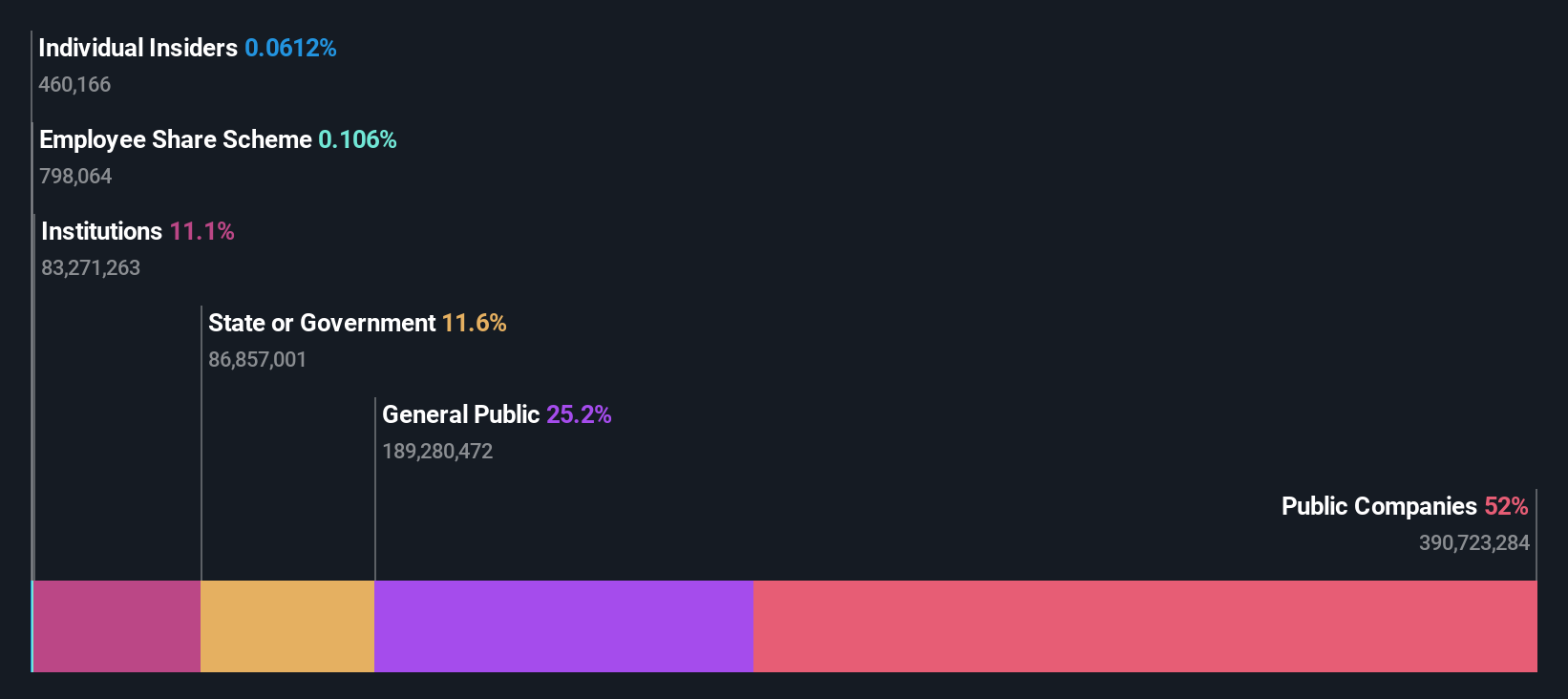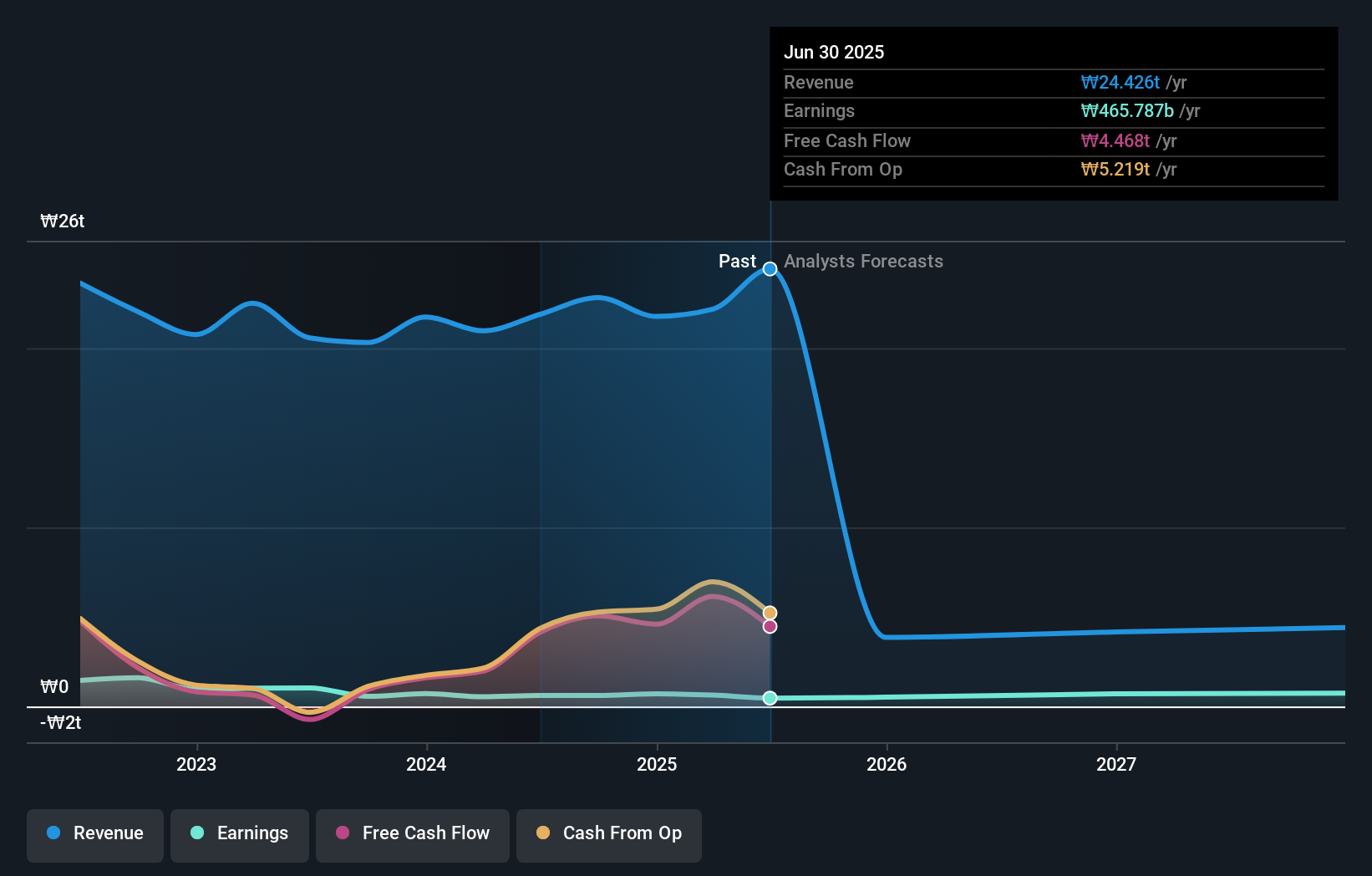- South Korea
- /
- Insurance
- /
- KOSE:A088350
Hanwha Life Insurance Co., Ltd.'s (KRX:088350) stock price dropped 3.0% last week; public companies would not be happy
Key Insights
- The considerable ownership by public companies in Hanwha Life Insurance indicates that they collectively have a greater say in management and business strategy
- 62% of the business is held by the top 2 shareholders
- Institutions own 11% of Hanwha Life Insurance
Every investor in Hanwha Life Insurance Co., Ltd. (KRX:088350) should be aware of the most powerful shareholder groups. With 52% stake, public companies possess the maximum shares in the company. That is, the group stands to benefit the most if the stock rises (or lose the most if there is a downturn).
As a result, public companies as a group endured the highest losses last week after market cap fell by ₩71b.
Let's take a closer look to see what the different types of shareholders can tell us about Hanwha Life Insurance.
View our latest analysis for Hanwha Life Insurance

What Does The Institutional Ownership Tell Us About Hanwha Life Insurance?
Many institutions measure their performance against an index that approximates the local market. So they usually pay more attention to companies that are included in major indices.
We can see that Hanwha Life Insurance does have institutional investors; and they hold a good portion of the company's stock. This can indicate that the company has a certain degree of credibility in the investment community. However, it is best to be wary of relying on the supposed validation that comes with institutional investors. They too, get it wrong sometimes. If multiple institutions change their view on a stock at the same time, you could see the share price drop fast. It's therefore worth looking at Hanwha Life Insurance's earnings history below. Of course, the future is what really matters.

Hanwha Life Insurance is not owned by hedge funds. The company's largest shareholder is Hanwha Corporation, with ownership of 50%. In comparison, the second and third largest shareholders hold about 12% and 6.4% of the stock.
To make our study more interesting, we found that the top 2 shareholders have a majority ownership in the company, meaning that they are powerful enough to influence the decisions of the company.
Researching institutional ownership is a good way to gauge and filter a stock's expected performance. The same can be achieved by studying analyst sentiments. There are a reasonable number of analysts covering the stock, so it might be useful to find out their aggregate view on the future.
Insider Ownership Of Hanwha Life Insurance
The definition of company insiders can be subjective and does vary between jurisdictions. Our data reflects individual insiders, capturing board members at the very least. Company management run the business, but the CEO will answer to the board, even if he or she is a member of it.
Insider ownership is positive when it signals leadership are thinking like the true owners of the company. However, high insider ownership can also give immense power to a small group within the company. This can be negative in some circumstances.
Our most recent data indicates that insiders own less than 1% of Hanwha Life Insurance Co., Ltd.. It's a big company, so even a small proportional interest can create alignment between the board and shareholders. In this case insiders own ₩1.4b worth of shares. Arguably, recent buying and selling is just as important to consider. You can click here to see if insiders have been buying or selling.
General Public Ownership
The general public-- including retail investors -- own 25% stake in the company, and hence can't easily be ignored. While this group can't necessarily call the shots, it can certainly have a real influence on how the company is run.
Public Company Ownership
It appears to us that public companies own 52% of Hanwha Life Insurance. This may be a strategic interest and the two companies may have related business interests. It could be that they have de-merged. This holding is probably worth investigating further.
Next Steps:
It's always worth thinking about the different groups who own shares in a company. But to understand Hanwha Life Insurance better, we need to consider many other factors. Take risks for example - Hanwha Life Insurance has 2 warning signs we think you should be aware of.
Ultimately the future is most important. You can access this free report on analyst forecasts for the company.
NB: Figures in this article are calculated using data from the last twelve months, which refer to the 12-month period ending on the last date of the month the financial statement is dated. This may not be consistent with full year annual report figures.
Valuation is complex, but we're here to simplify it.
Discover if Hanwha Life Insurance might be undervalued or overvalued with our detailed analysis, featuring fair value estimates, potential risks, dividends, insider trades, and its financial condition.
Access Free AnalysisHave feedback on this article? Concerned about the content? Get in touch with us directly. Alternatively, email editorial-team (at) simplywallst.com.
This article by Simply Wall St is general in nature. We provide commentary based on historical data and analyst forecasts only using an unbiased methodology and our articles are not intended to be financial advice. It does not constitute a recommendation to buy or sell any stock, and does not take account of your objectives, or your financial situation. We aim to bring you long-term focused analysis driven by fundamental data. Note that our analysis may not factor in the latest price-sensitive company announcements or qualitative material. Simply Wall St has no position in any stocks mentioned.
About KOSE:A088350
Hanwha Life Insurance
Provides insurance products to individual and corporate customers in South Korea and internationally.
Undervalued with adequate balance sheet.
Similar Companies
Market Insights
Community Narratives



